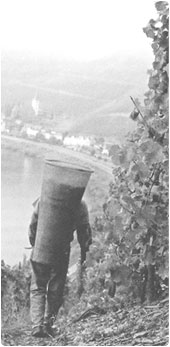|
|
| History of German Riesling Wine |
| |
 |
Germany has a history of winemaking that dates back to 100 B.C. when ancient Romans, who conquered the region, began producing wines on local soil. It was the Romans, who already recognized the potential of sites like the Piesporter Goldtröpfchen, Mosel and who cultivated grapes there. Researchers have found a wine press in Piesport that dates back to 400 A.D., making it the largest Roman wine press ever found north of the Alps.
Riesling's origin is a mystery, but it is believed that the grape is indigenous to Germany. The first documented evidence of it's existence comes from the purchase of six Riesling vines for the amount of 22 soildi bought by Count Katzenelnbogen at Ruesselsheim in Germany from Klaus Kleinfish on March 13, 1435. Then in 1463 it has been documented that the St. Jacob Hospice in Trier bought 1,200 'Ruesseling' vines. Next, a reference to a "Rissling wingart' was made at Pfeddersheim in 1511 showing that Riesling's popularity was starting to spread.
The most important development in the spread of Riesling as the "grape of Germany" took place at the Benedictine Abbey in Johannisberg in the Rheingau. In |
1716 the Prince-Abbey of Fulda purchased the rundown priory. The vineyards, which were in total neglect, were completely restored and replanted with Riesling vines within five years. In 1720/21 294,000 vines were planted. The vines were purchased from Ruedesheim, Eberbach, and Floersheim, further indicating the extent of the grape. Schloss Johannisberg, of course, set the standards for the grape, and other areas soon decreed that Riesling should be the grape planted. In 1744, for example, the Bishop of Speyer, Cardinal Christoph von Hutten insisted upon the destruction of Elbling vines and the planting of Riesling. Even more important was the proclamation of Clemens Wenzeslaus, Elector of Trier, on May 8, 1787 that all inferior vines be dug up and replanted with noble varietals. He meant Riesling, and the Mosel-Saar-Ruwer area celebrates every year the Wenzeslaus pronouncement.
In 1845, Queen Victoria of England visited the Rheingau, where she discovered her love for German Riesling and coined the term "Hock", which is synonymous with German Riesling in Britain today, but originally referred to Riesling from the Rhine community of Hochheim.
The examples of Johannisberg and Wenzeslaus started a Riesling boom in the Rheingau and the Mosel. The wines were so successful that by the turn of the century the Benedictine Monk Odo Staab at Johannisberg, could claim that "other than Riesling no other varietal should be used to produce wines in the Rheingau." By the end of the 19th century it was the dominant grape in the Rheingau, and it had made significant inroads in all other growing areas of Germany.
Here is an anecdote regarding the origins of the noble sweet Rieslings which have been attributed to a legend from Schloss Johannisberg in Germany in the late harvest of 1775. According to the tale, a messenger who was bringing the orders to pick the grapes was robbed and detained. When he arrived at the vineyard all of the grapes were rotted, infected with botrytis, and were given to the peasants, who then made their own wines from them. The high sugar levels of the late harvest rotted grapes maintained their acidity. The infection of fungus known as botrytis (so-called "noble rot") also bring very rich special flavor to the wine. This is how sweet Riesling was born. The botrytis-infected Riesling wines are still present today and are rated by sweetness as Auslese, Beerenauslese, and Trockenbeerenauslese respectively.
Sadly, a reversal of the trend Riesling as the dominant grape began in the early 20th century as German growers, spurred by new trends in science, began experimenting with various varietals such as Silvaner. By 1930, only 57% of the vines planted in the Rheingau were Riesling.
In the 1960s and 70s, Germany's wine production also lost its luster, when large quantities of sweet blended wines were created for export, among them the infamous Liebfraumilch and Blue Nun. While Germany continued to make and drink high quality wines (most Germans have never heard of either brand), sweet non-descript wines became synonymous with German wines internationally.
Fortunately today this trend has been reversed for all the significant classic vineyards in Germany. The areas were Riesling produces superior wines such as the Mosel and the Rheingau are now, once again, being recognized as having an important historical and viticultural place over the world. Consequently, wine grower in these and other areas have joined together to decree that Riesling is the great wine grape of Germany.
Recently aaccording to Steffen Schindler, director of foreign marketing at the German Wine Institute (DWI), "The reputation of German wines has increased enormously in the past few years. Leading wine writers around the world are raving about our top Riesling wines, and the wine lists of many a fine restaurant from New York to Sydney now feature German Rieslings. In addition, more than 60 percent of the worldwide area planted with Riesling is in Germany. As such, German wine-growers are particularly able to profit from the Riesling renaissance." German export of Riesling reached their highest level ever in 2006, according to the latest figures. An increasing number of high quality German wines are now finding their way across the Atlantic, recapturing the reputation.
|
|
|
|

